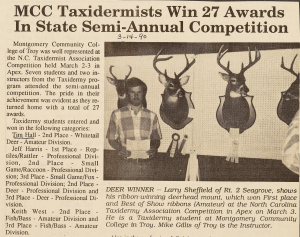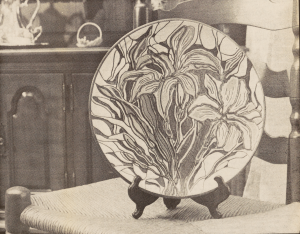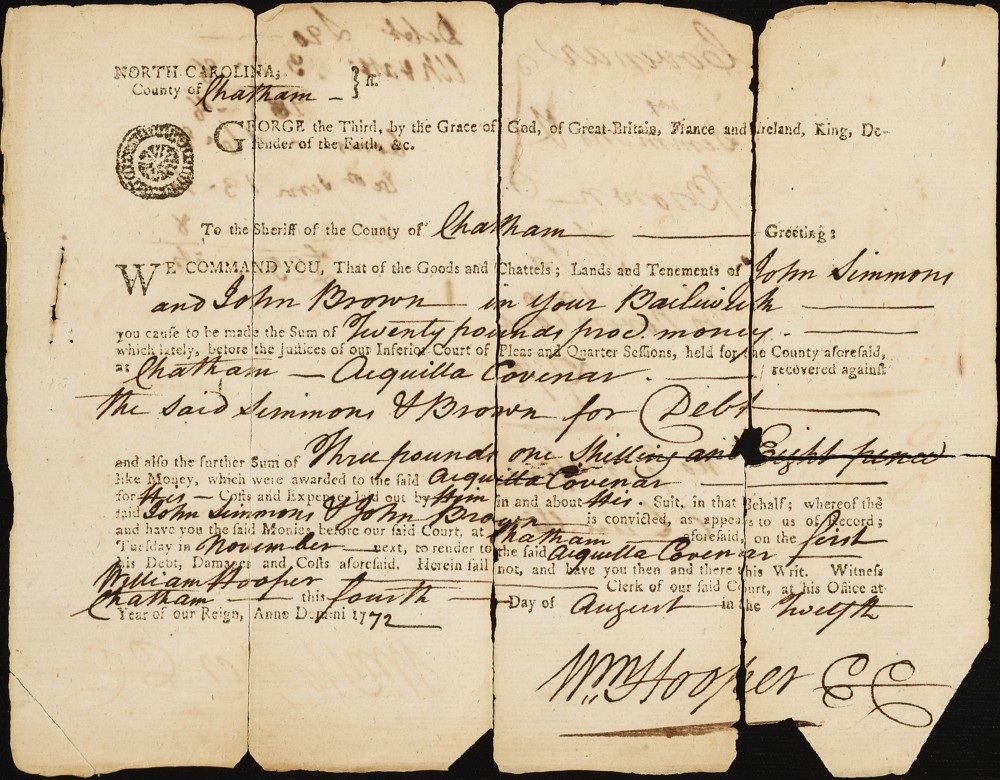Thanks to our partner, Chatham County Historical Association, batches containing three Moncure and Pittsboro High School yearbooks as well as court summonses signed by William Hooper are now available on our website. These court summonses, created three years before the American Revolution began, are some of the oldest primary source documents available on DigitalNC.
During his position as Chatham County’s first Clerk of Court, William Hooper executed a myriad of legal documents. Over the years, three of these legal documents were donated to the Chatham County Historical Association where they were held until 2022. In March 2022, the historical association learned that the Hooper court summonses should have originally been transferred to the State Archives since they are responsible for the preservation of records from all counties, state agencies, and government offices in North Carolina—no matter how old the material. After contacting the State Archives, a representative came to collect the three court summonses from the association. At the State Archives the court summonses are being curated and properly preserved. To learn more about the Chatham County Historical Association’s experience with the State Archives, please read the association’s post here.
William Hooper was one of North Carolina’s three signers of the Declaration of Independence and the North Carolina representative member of the Continental Congress from 1774 to 1777. After graduating from Harvard College in 1760 at the age of 18, Hooper went on to study law under James Otis. In 1764, he temporarily settled in Wilmington, North Carolina to begin practicing law. Popular with the people of the area, he was elected recorder of the borough two years after his arrival in 1766. From May 1771 to November 1772, Hooper served as Chatham County’s first Clerk of Court despite never living in the county. In the years leading up to the American Revolution, Hooper traveled across North Carolina as a lawyer, was appointed deputy attorney general of the Salisbury District, and officially entered into the political world when he represented the Scots settlement of what is currently named Fayetteville in the Provincial Assembly in 1773. In the years leading up to the American Revolution, Hooper traveled across North Carolina as a lawyer, was appointed deputy attorney general of the Salisbury District, and officially entered into the political world when he represented the Scots settlement of what is currently named Fayetteville in the Provincial Assembly in 1773.
On July 21, 1774, he was elected chairman and presided over the selection of a committee to a call for the First Provincial Congress. When the Congress met, Hooper was chosen as one of three delegates that would represent the state of North Carolina at the First Continental Congress. Over the next two years Hooper served as a delegate for both the Provincial and Continental Congress on various committees including one that was in charge of stating the rights of colonies, one that reported on legal statutes affecting trade and commerce in the colonies, Thomas Jefferson’s committee to compose the Declaration of Independence, a committee for the regulation of the secret correspondence, and many more. Despite Hooper’s triumphs in the political sphere early in the revolution, his return to Wilmington in early 1777 due to contracting yellow fever began a steady decline for his political career and, consequently, his health.
Hooper attended the General Assembly, serving on multiple committees as the member for Wilmington each year from 1777 until the city was taken over by the British in 1781. Considered a fugitive by the British, Hooper hopped to various friends houses in the Windsor-Edenton area while his wife Anne and children fled to Hillsborough. Reunited in 1782 in Hillsborough, the family was permanently removed to the backcountry where they remained out of touch with national and state current events. In that same year, Hooper’s election to General Assembly as member for Wilmington was declared invalid (presumably since he was now in Hillsborough). The following year, he ran for the General Assembly’s Hillsborough seat and lost. In spite of this loss, Hooper ran again in 1784 and was this time elected. He would serve in the General Assembly as a representative for Hillsborough until 1786.
Although he enjoyed some political success since he left Philadelphia in 1777, Hooper was devastated when he was not elected a delegate to the 1788 Constitutional Convention. Certainly adding to his feelings of discontent, the convention met at Hillsborough’s St. Matthew’s Church, which was within sight and sound of Hooper’s house. As a result of what he saw as a failure, Hooper began to drown his feelings of disappointment in rum. At the age of 48, Hooper died the evening before his daughter’s marriage in 1790.
To learn more about the Chatham County Historical Association’s experience with the State Archives, please read the association’s post here.
To learn more about the Chatham County Historical Association, please visit their website.
For more yearbooks from across North Carolina, visit our yearbook collection.
To learn about William Hooper’s life in more depth, please view NCpedia’s entry on William Hooper.
Information in this blog post was taken from the NCpedia William Hooper entry.





